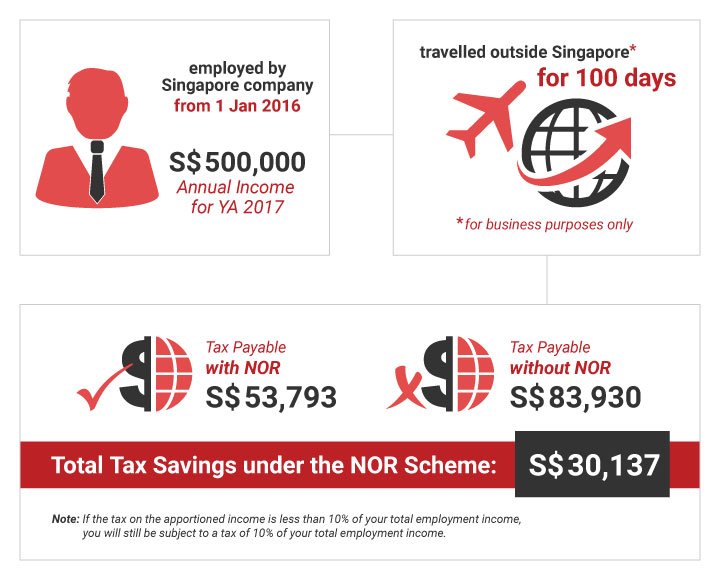 One of the major attractions for foreign entrepreneurs, companies and professionals when they relocate their businesses, careers or lives to Singapore is taxation. In addition to liberal tax policies, tax in Singapore is one of the lowest rates in the world for corporations and individuals alike.
One of the major attractions for foreign entrepreneurs, companies and professionals when they relocate their businesses, careers or lives to Singapore is taxation. In addition to liberal tax policies, tax in Singapore is one of the lowest rates in the world for corporations and individuals alike.
Below we summarize everything that is to know about corporate and personal taxation in Singapore:
Singapore Taxation in a Nutshell
Tax Authorities:
 Inland Revenue Authority of Singapore (IRAS)– a statutory board under the Ministry of Finance of Singapore, which is responsible for collecting personal income tax, corporate tax, property tax, goods & services tax, betting taxes and stamp duty.
Inland Revenue Authority of Singapore (IRAS)– a statutory board under the Ministry of Finance of Singapore, which is responsible for collecting personal income tax, corporate tax, property tax, goods & services tax, betting taxes and stamp duty.
Tax Laws:
Income Tax Act (Chapter 134), Property Tax Act (Chapter 254), Stamp Duties Act (Chapter 312), Goods & Services Tax Act (Chapter 117A)
International Organizations of which Singapore is a Member Nation:
WTO, Commonwealth, ASEAN, APEC
Tax Treaties that Singapore has with other Nations/Regions:
Singapore has concluded 88 Avoidance of Double Taxation Agreements, eight Limited Treaties, two Exchange of Information Arrangements with Bermuda and USA, and six Agreements which have been signed but not ratified.
Additionally, Singapore is a signatory to Convention on Mutual Administrative Assistance in Tax Matters, developed jointly by the OECD and the Council of Europe.
The city-state has also signed the Foreign Account Tax Compliance Act (FATCA) enacted by the United States (US) Congress in March 2010 to target non-compliance with US tax laws by US persons using foreign accounts.
Singapore Personal Taxation
 Different tax rates apply to tax-resident and non-resident individuals in Singapore.
Different tax rates apply to tax-resident and non-resident individuals in Singapore.
Personal Income Tax Rates for Tax Residents
You are a tax resident in Singapore if you meet one of the following criteria:
- a citizen or a permanent resident residing in Singapore except for temporary absences; or
- a foreigner who has stayed / worked in Singapore (excludes director of a company) for 183 days or more in the year before the year-of-assessment
For a tax-resident, the rates applicable are:
| INDIVIDUAL TAX RATES OF TAX FOR YEAR 2019 (YEAR OF ASSESSMENT 2020) | |||
|---|---|---|---|
| Chargeable Income | Income Tax Rate (%) | Gross Tax Payable ($) | |
| On the first On the next |
20,000 10,000 |
0 2 |
0 200 |
| On the first On the next |
30,000 10,000 |
– 3.5 |
200 350 |
| On the first On the next |
40,000 40,000 |
– 7 |
550 2,800 |
| On the first On the next |
80,000 40,000 |
– 11.5 |
3,350 4,600 |
| On the first On the next |
120,000 40,000 |
– 15 |
7,950 6,000 |
| On the first On the next |
160,000 40,000 |
– 18 |
13,950 7,200 |
| On the first On the next |
200,000 40,000 |
– 19 |
21,150 7,600 |
| On the first On the next |
240,000 40,000 |
– 19.5 |
28,750 7,800 |
| On the first On the next |
280,000 40,000 |
– 20 |
36,550 8,000 |
| On the first In excess of |
320,000 320,000 |
– 22 |
44,550 |
For Non-resident Individuals
- up to 60 days – the employment income is tax exempt if the individual is in Singapore on short-term employment for 60 days or less in a year; do note that the exemption does not apply to a director of a company, a public entertainer or exercising a profession in Singapore
- 61 – 182 days – the individual is taxed on all income earned in Singapore (no personal relief apply) at 15% or the resident rate, whichever gives rise to a higher tax amount
- director fees, consultant fees and all other incomes are taxed at 22%
Not Ordinarily Resident Scheme
The NOR Scheme has expired. However, the last NOR status granted will be valid from YA 2020 to 2024. Individuals who were previously granted the NOR status will continue to benefit from the NOR tax concessions until their NOR status expires. “
A special scheme called the Not Ordinarily Resident Scheme (NOR) grants favourable tax treatment to qualified individuals for a period of 5 years of assessment.
To retain your status as an NOR taxpayer, you are only required to be a tax resident in the first year of assessment. You are not required to be tax resident throughout the five-year qualifying period.
Benefits of the NOR Scheme:
- a NOR taxpayer pays income tax on only that part of his employment income that corresponds with the number of days he spends in Singapore
- a NOR taxpayer gets to enjoy tax exemption on contributions made by the employer to an overseas pension fund which would otherwise be taxable in his hands
Personal Tax Under the NOR Scheme
Tax Compliance of Individuals
Every individual, whether resident or non-resident, is required to file a separate tax return every calender year on all his or her incomes including gains or profits from a trade or profession and earnings from employment.
Do note that foreign-source income of a Singapore tax-resident is exempt from income tax in Singapore, except for the income received through a partnership in Singapore. The tax return filing must be done in respect of income from the preceding year in the following year by April 15 (for paper filing) and by April 18 (for e-filing).
Other Taxes on Individuals
(1) Property Tax
 This is a kind of wealth tax imposed in Singapore on property ownership irrespective of whether the property is occupied or vacant. It is applicable to government-built Housing Development Board flats as well as private homes. The rates are progressive and are different for owner-occupied and non-owner-occupied homes to encourage home-ownership in the country. The rates are 0% to 16% (from 1 January 2015) for owner- occupied residential property; 10% to 20% for non-owner-occupied residential property; and 10% for non-residential property.
This is a kind of wealth tax imposed in Singapore on property ownership irrespective of whether the property is occupied or vacant. It is applicable to government-built Housing Development Board flats as well as private homes. The rates are progressive and are different for owner-occupied and non-owner-occupied homes to encourage home-ownership in the country. The rates are 0% to 16% (from 1 January 2015) for owner- occupied residential property; 10% to 20% for non-owner-occupied residential property; and 10% for non-residential property.
(2) Tax on Rental Income
Singapore also imposes income tax on investment homes, which can be understood as income tax on the rental income. Rental income is taxable when it is due and payable to the property owner, and not the date of actual receipt. Do note that rental income from the letting of property in Singapore is subject to income tax, while the property itself is subject to property tax. A tax resident in Singapore pay resident tax rates on his or her rental income.
(3) Stamp Duty
Stamp Duty is a tax on documents relating to immovable properties, stocks or shares including lease/tenancy agreements, mortgages, and share transfer documents. Once the document is signed and dated, the duty needs to be paid, which can be done easily using IRAS’ e-Stamping system.
(4) Motor Vehicle Taxes
These are taxes, other than import duties, that are imposed on motor vehicles. These taxes are imposed to curb car ownership and road congestion, and include the various registration fees, excise duty, road tax and special tax.
(5) Social security or Central Provident Fund (CPF) contributions
Payable to Singapore Citizens and Permanent Residents, every company in Singapore is required to pay the employer’s share of CPF contributions monthly for all applicable employees. Employees too are required to contribute to the CPF at a rate of 20%. Graduated rates may apply for the first three years when the employee first attains permanent residence. The employer’s statutory contribution rate to CPF is currently 17%, subject to a monthly ordinary wage ceiling of S$6,000 and total annual wage ceiling of S$ 102,000. The contribution is remitted by the employer (in respect of its own contributions and that of the employee).
(6) Capital gains
None as the city-state imposes no capital gains tax.
(7) Capital duty
None
(8) Capital acquisitions tax
None
(9) Inheritance/estate tax
None
(10) Net wealth/net worth tax
None
Singapore Corporate Taxation
Tax-residency for companies in Singapore
 For foreign sourced service income, the IRAS always determine the “fixed place of operation”, before deciding on the tax exemption. It refers to a place of management, an office, or a certain amount of floor space, with a degree of permanence and regular usage.
For foreign sourced service income, the IRAS always determine the “fixed place of operation”, before deciding on the tax exemption. It refers to a place of management, an office, or a certain amount of floor space, with a degree of permanence and regular usage.
The Authority usually takes into account from where the management and control of the company was exercised while deciding the residency of a company and issue a Certificate of Residence (COR).
The factors, which determines if the control and management was indeed carried out from Singapore, include the decision-making body’s power to raise finance and control the company’s bank accounts; approve accounts; appoint those who manage the company’s day-to-day operations; declare dividends; as well as decide on matters relating to mergers/acquisitions/joint ventures.
It is also important for getting the COR that the directors live and keep the books and records of the company in Singapore.
Corporate Tax System
The system prevalent in Singapore is called a one-tier corporate tax system, under which tax paid by a company on its chargeable income is the final tax. The taxation is on territorial basis which means that tax is imposed on all income accrued in or derived from Singapore, as well as all foreign-sourced income remitted to the country, with certain exemptions.
Corporate Tax Rates
The corporate income tax rate since 2010 has been fixed at 17%. It is calculated on the basis of the company’s chargeable income i.e. taxable revenues less allowable expenses and other allowances. But the effective tax payable comes out to even lower if one takes advantage of all the government incentives, subsidies and schemes.
Corporate income tax (CIT) rebate
In 2013, the government announced that all companies will be granted a corporate income tax rebate that is subject to an annual cap.
All companies will receive a corporate income tax rebate of the following:
- 25% corporate income tax rebate, capped at $15,000 for YA 2020;
- 20% corporate income tax rebate, capped at $10,000 for YA 2019;
- 40% corporate income tax rebate, capped at $15,000 for YA 2018;
- 50% corporate income tax rebate, capped at $25,000 for YA 2017;
- 50% corporate income tax rebate, capped at $20,000 for YA 2016; and
- 30% corporate income tax rebate, capped at $30,000 per YA for YA 2013 to YA 2015.
The list of beneficiaries of this new scheme even includes registered business trusts, non-tax resident companies in Singapore, and companies already receiving income taxed at a concessionary tax rate. But it doesn’t apply to the amount of income of a resident company, which is subject to final withholding tax.
Fiscal year determination
Each company in Singapore has to determine its financial year end (FYE), which does not necessarily be December 31. Though it’s always advisable to keep the company’s FYE within 365 days in order to enjoy the zero tax exemption for new start-up companies (75% on the first S$100,000 of normal chargeable income for its first three consecutive years of operations).
Estimated Chargeable Income (ECI)
ECI is an estimate of a company’s chargeable income for a Year of Assessment, which must be submitted to IRAS within three months after the end of the financial year.
Foreign Exchange Control
 There are no significant restrictions on foreign exchange transactions and capital movements. Thus, funds may flow freely into and from Singapore.
There are no significant restrictions on foreign exchange transactions and capital movements. Thus, funds may flow freely into and from Singapore.
While the government imposes certain restrictions on the lending of Singapore Dollars (SGD) to non-resident financial institutions, these restrictions do not apply to the lending of SGD to individuals and non-financial institutions, including corporate treasury centres.
Annual Filing Requirements
Annual returns with Accounting and Corporate Regulatory Authority (ACRA)
 Every company must file its annual returns to ACRA – National regulator of business entities and public accountants in Singapore, within one month of its AGM date. Do note that consolidated returns are not permitted and each company is required to file its returns separately.
Every company must file its annual returns to ACRA – National regulator of business entities and public accountants in Singapore, within one month of its AGM date. Do note that consolidated returns are not permitted and each company is required to file its returns separately.
Annual taxes with IRAS
Tax returns are required to be filed by November 30 of the assessment year for income earned in the preceding accounting year.
Carrying Losses Forward
Companies in Singapore are allowed to carry forward the unabsorbed trade (rental) losses and capital allowances to subsequent years to offset against the income of those years until the trade losses are fully utilised.
Tax Exemptions
Start-up Tax Exemption (SUTE) scheme for newly-incorporated companies:
The eligibility conditions include:
- must have no more than 20 individual shareholders
- in case of corporate shareholders, one individual must hold at least 10% of the issued shares
- property and investment holding companies are not eligible
If the above three conditions are satisfied, tax exemption is given to start-ups on normal chargeable income of up to S$200,000 for each of the first three consecutive years of its operation.
- For first S$100,000, after 75% exemption, the exempt amount is S$100,000
- For next S$100,000, after 50% exemption, the exempt amount is S$50,000
- Thus, the total exempt amount for income up to S$200,000 is S$125,000
Effective Corporate Tax Rates for Individual Shareholding (YA 2020)
| Chargeable Income ($) | Estimated Tax (S$) | *Effective tax rate |
|---|---|---|
| 100,000 | 3,188 | 3.19% |
| 200,000 | 9,563 | 4.78% |
| 300,000 | 22,313 | 7.44% |
| 400,000 | 35,063 | 8.77% |
| 500,000 | 48,750 | 9.75% |
| 1,000,000 | 133,750 | 13.38% |
| 2,000,000 | 303,750 | 15.19% |
| 3,000,000 | 473,750 | 15.79$ |
| 5,000,000 | 813,750 | 16.28% |
| 10,000,000 | 1,663,750 | 16.64% |
Note: After 25% corporate tax rebate (Max. $15,000)
Effective Corporate Tax Rates for Corporate Shareholding and after the Third Year (YA 2020)
Effective Corporate Tax Rate with Partial Exemption: Companies in Singapore are given partial tax exemption on normal chargeable income of up to S$200,000.
- For first S$10,000, after 75% exemption, the exempt amount is S$7,500
- For next S$190,000, after 50% exemption, the exempt amount is S$95,000
- Thus, the total exempt amount for income up to S$200,000 is S$102,500
| Chargeable Income ($) | Estimated Tax (S$) | *Effective tax rate |
|---|---|---|
| 100,000 | 6,056 | 6.06% |
| 200,000 | 12,431 | 6.22% |
| 300,000 | 25,181 | 8.39% |
| 400,000 | 37,931 | 9.48% |
| 500,000 | 52,575 | 10.52% |
| 1,000,000 | 137,575 | 13.76% |
| 2,000,000 | 307,575 | 15.38% |
| 3,000,000 | 477,575 | 15.92$ |
| 5,000,000 | 817,575 | 16.35% |
| 10,000,000 | 1,667,575 | 16.68% |
Note: After 25% corporate tax rebate (Max. $15,000)
Tax Exemption for Foreign-sourced Income
Detailed in Sections 13 (7A) to 13 (11) of the Income Tax Act (ITA) of Singapore, companies can benefit from the Foreign-sourced Income Exemption scheme (FSIE), which is applicable to:
- Foreign-sourced dividend: A dividend paid by a non-Singapore tax resident company, which may have been temporarily deposited into a foreign custodian account before its remittance into Singapore. However such remittance must be made within one year from the date it was deposited into the foreign custodian account and any interest earned on such deposit must not be included in the dividend, for which FSIE is sought.
- Foreign branch profits: Profits generated by business operation of a Singapore company registered as a branch in a foreign country. It excludes non-trade or non-business income of the foreign branch.
- Foreign-sourced service income: Income generated by a resident taxpayer for services provided through a fixed place of operation in a foreign country. This may mean a place of management, an office, or a certain amount of floor space at the disposal of the specified resident taxpayer.
Do note that these exemptions apply only when the headline corporate tax rate in the foreign country from which the income is received is at least 15%, and the income had already been subjected to tax in that particular country.
Avoiding Double Taxation
 Sometimes, foreign income of a Singapore tax resident company may be subject to taxation twice – once overseas, and then a second time when the income is remitted into Singapore. For such cases, the Inland Revenue Authority of Singapore (IRAS) has a foreign tax credit (FTC) scheme, which allows the company to claim a credit for the tax paid in the foreign country against the Singapore tax that is payable on the same income.
Sometimes, foreign income of a Singapore tax resident company may be subject to taxation twice – once overseas, and then a second time when the income is remitted into Singapore. For such cases, the Inland Revenue Authority of Singapore (IRAS) has a foreign tax credit (FTC) scheme, which allows the company to claim a credit for the tax paid in the foreign country against the Singapore tax that is payable on the same income.
Under this, two types of credit or relief can be claimed:
(1) Double tax relief (DTR)
DTR is the credit relief provided under Avoidance of Double Tax Agreements (DTAs) to counter double taxation scenarios.
(2) Unilateral tax credit (UTC)
It’s a scheme for foreign tax paid by Singapore tax residents in countries with which the city-state has no DTA. It is allowed only when repatriated income is generated by income from professional, consultancy and other services; royalty income, which is not borne, directly or indirectly, by a person resident in Singapore or a permanent establishment in Singapore, or is not deductible against any income accruing in or derived from Singapore; dividends income; employment income; and branch profits.
The government, in 2011, also introduced a FTC pooling system to give businesses greater flexibility in their FTC claims, reduce the taxes payable on foreign income, and to simplify tax compliance. The eligibility conditions were the same as in FSIE i.e. the headline corporate tax rate in the foreign country from which the income is received is at least 15%, and the income had already been subjected to tax in that particular country.
Withholding Tax
 In Singapore Withholding Tax is applicable to payments made to non-residents (including employees, business partners and overseas agents).
In Singapore Withholding Tax is applicable to payments made to non-residents (including employees, business partners and overseas agents).
Singapore companies are legally mandated to withhold a percentage of the payment they make to a non-resident and pay the withheld amount to IRAS, which is called the Withholding Tax.
Withholding Tax Rates:
For management fees, technical and other service fees paid to a non-resident company, tthe Withholding Tax is 15% of the gross payment. Alternatively, the non-resident individual may opt to be taxed at the non-resident rate of 22% of the net income instead. For other types of payments, the Withholding Tax rate is 10% or 15%. Where a double tax agreement is applicable, the rates specified in the agreements of the respective countries apply.
The reduced rates of 10% or 15% apply to payments made to non-residents which are not derived by any trade, business, profession or vocation carried on Singapore; and are not effectively connected with any permanent establishment of the non-residents in Singapore. Therefore in other cases, prevailing corporate tax rate (currently 17%) will apply for non-residents companies.
Withholding Tax Filing Deadline:
If date of payment is from 01 July 2020 onwards, the filing of Form IR37/A/B/C/D and payment of withholding tax must be made to IRAS by the 15th of the second month from the date of payment to the non-resident.
Branch remittance tax – No
Other Taxes on Companies
(1) Goods & Services Tax (GST):
 Goods & Services Tax (GST) is a broad-based consumption tax levied on the import of goods (collected by Singapore Customs), as well as nearly all supplies of goods and services in Singapore. However, some items are specifically exempt from GST include financial services and the sale or lease of residential properties. A company must be registered to collect GST if its annual turnover exceeds or is likely to exceed S$1 million from the sale of taxable goods and services. This requirement may be waived if most of the goods or services are exported or supplied internationally (“zero-rated supplies”). The current rate for GST in Singapore is 7%.
Goods & Services Tax (GST) is a broad-based consumption tax levied on the import of goods (collected by Singapore Customs), as well as nearly all supplies of goods and services in Singapore. However, some items are specifically exempt from GST include financial services and the sale or lease of residential properties. A company must be registered to collect GST if its annual turnover exceeds or is likely to exceed S$1 million from the sale of taxable goods and services. This requirement may be waived if most of the goods or services are exported or supplied internationally (“zero-rated supplies”). The current rate for GST in Singapore is 7%.
(2) Stamp Duty:
Stamp duty is a tax on documents relating to immovable properties, stocks or shares. Examples of such documents are lease/tenancy agreements, mortgages, and share transfer documents. While there is no Additional Buyer Stamp Duty (ABSD) for commercial properties, industrial properties (a type of commercial properties) attracts the Seller’s Stamp Duty. This is 12% of the sale price if sold on the first year, 8% for the second year, and 4% for the third year.
(3) Foreign Worker Levy
Singapore companies are required to pay foreign worker levy (FWL) for their certain work visa holding employees (Work Permit and S Pass). This is a price mechanism introduced by the Singapore Government to regulate the foreign manpower numbers in the country. The amount of FWL to be paid for each worker is determined by the sector the employer/company belongs to, and the educational qualifications and skills of the workers. Employers can avail some concessions in the levy if they employ skilled workers with relevant qualifications.
(4) Property Tax, and Social security or Central Provident Fund contributions
Provisions are the same as mentioned in the Personal Taxation segment earlier.
(5) Capital duty
None
(6) Transfer tax
None
You take care of business. We’ll take care of your taxation needs.
File your tax returns with Singapore Company Incorporation, one of the leading tax agents in Singapore. Our professional taxation specialists will work closely with you to reduce your tax liabilies and maximise tax savings.

